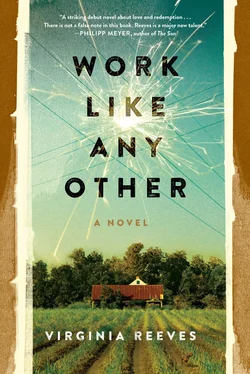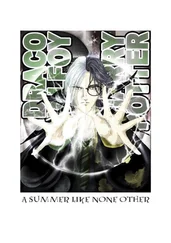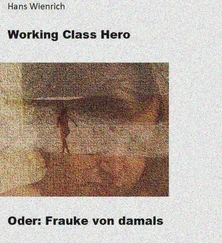The balding man pinches his nose and closes my file. “Mr. Martin”—I hear that it is not patience in his voice, but a deep exhaustion—“let me be clear. With your history, you will never again be employed by an electrical company within the state of Alabama. Likely, you’ll never be employed in the country. What we are trying to glean is whether you’re willing to start anew as a productive member of society in a different line of work. Does this make sense?”
Of course it does, just like his explanation of the proceedings. Unlike the four years I’ve spent in Kilby, everything said in this room does nothing if not make sense.
“Mr. Martin, am I clear?”
I nod.
The guard who followed me in shouts, “Answer the man’s question!”
“Yes, sir.” I turn my attention to the rest of the board. “There’s electrical work I could do here though, to assist the prison.”
“Shut up, Martin,” the guard says. “You’re done.”
But the man in the center says, “What work is that, Mr. Martin?”
“The wiring on the chair. The chair that Ed Mason’s built. I’ve heard the parameters — twenty-two hundred volts, two or three points of contact. I can wire that easily.”
The balding man looks at me questioningly. “Mr. Martin, I would not recommend that you lend your electrical expertise to any part of this prison, let alone a part as significant as the one you’ve just mentioned. You have succeeded in electrocuting a man, but you did so by accident. I’d hate to see what would become of the poor fellow you intentionally tried to kill.”
The guard chuckles, but the balding man isn’t smiling. The men on either side of him aren’t either.
“I imagine I can speak for the board when I say that we are denying your parole, Mr. Martin,” the balding man says. The others nod. “You will be eligible for a subsequent hearing in two years.”
“Don’t you need to deliberate?”
The man in the center writes in my folder. He doesn’t answer my question, but says instead, “I’ll hope for improvement in our next hearing, Mr. Martin.” His voice is definitive, severing. The guard pulls me away. I turn my head for a last clear view of that tower, and I think of the lighthouse I’ll never inhabit on the rocky coast I’ll never see.
Marie didn’t hire a lawyer for Roscoe’s defense. She told the court there weren’t funds to pay an attorney, that he’d need a state defender. She made that choice, and Roscoe would be fine. She was sure because when a man was convicted in the state of Alabama in 1922, his prison assignment depended most on the color of his skin. White men were imprisoned in state-of-the-art facilities; Negro men were leased to private companies. Marie’s father had followed the state’s leasing system, and he’d spent much of his life fighting it — writing letters and petitioning state officials. The mining industry’s voice was louder than his, though, and convict labor was still the cheapest available.
Marie knew that Wilson would be leased if he was convicted, and as much for her father as for Wilson, she fought in his defense. The lawyer she hired was good, but he couldn’t get the charges dropped. Wilson had taken too much of the blame to walk away a free man. He was given ten years.
Marie thought of her father shouting on the courthouse steps, This fine state leases its prisoners to private companies for rates lower than mules and plow horses! She saw him walking next to Wilson. Alabama condemns her convicts to a fate worse than slavery. This young man will be joining those ranks!
“I’m so sorry,” Marie whispered to Wilson as the guards led him from the courtroom. She whispered it to her father, as well, and to Moa and their children.
She envisioned Wilson’s future — leased to a big coal company, one of the many in the state that she’d learned about with her father, and then more thoroughly with Roscoe, son of a Banner foreman. How could she have forgiven Roscoe that black past, a childhood raised in coal?
She remembered the night he’d admitted it, the two of them still courting, sitting in that awful mess hall in the village, some foul meal before them. She’d told him about her father, so he knew the stakes of his admission, knew that their families would never speak to one another.
“My father was a foreman at Banner,” he’d said. “He lost most of his hearing in the 1911 explosion.” He didn’t regret his father’s hearing loss, Marie remembered, but rather mentioned it like a curse the man had earned.
“I don’t know about that incident,” she’d lied, wanting to hear Roscoe’s father’s version.
“It was a Saturday morning in early April.” Roscoe then told a story she’d heard as a girl, a story her father had read to her from the papers. Roscoe had known more.
John Wright was one of the only white convicts in the mine, and he was doing electrical work near a detonation site deep in a central tunnel. Four shooters were down there with him. No one — not even Roscoe or his father — knew exactly what spark lit that powder, but the blast was big when it went. “John was blown apart,” Roscoe reported, “and the four shooters died instantly.” Marie vaguely remembered these specifics.
The blast blew out the fan that kept fresh air flowing through the mine, and the auxiliary fan didn’t come on. Roscoe’s father was down in a shaft, but he was close enough to the surface to get out before the black damp consumed him, the unbreathable gases left after oxygen is sucked out of a tunnel. Even with the ringing in his head, he stayed at the site. Marie resented the pride that fought for space in Roscoe’s voice. He should’ve died, Marie had found herself thinking. He should’ve died with the men he forced into those mines .
The first attempt at a rescue mission didn’t happen until the next day, and the twelve-person rescue team all collapsed as soon as they entered the mine, knocked unconscious by the pent-up gases. The team was mostly doctors, and they were pulled out quick. No fatalities. Their close call put a stop to any additional attempts at rescue until the fans were up and running. Marie hadn’t heard those parts. They made her hate Roscoe’s father all the more.
When they’d finally flushed out the tunnels, rescue teams set out for the deeper guts of the mine. “They ran out car after car full of bodies,” Roscoe told her. “My father got a group of convicts to dig a long trench in the convict cemetery.”
“Your father? Your father assigned the digging?”
Roscoe had nodded. Marie hadn’t been sure his head hung low enough for the weight it should carry. Marie had never swayed from her father’s politics — from his view of right and wrong — so it was hard for her to conceive of a child so far from its father. Weren’t we all, at heart, our parents? Wasn’t Roscoe his father’s disciple?
She’d swallowed her suspicions.
“Onlookers started gathering the day of the explosion, and more came through the weekend.” Roscoe told her that no relatives were present, which Marie already knew. Convicts were shipped to Banner from all over the state; their families were far away and didn’t know they were there. “The crowd got so big, they had to cordon off the scene with rope and armed guards.
“The mine decided to sell some food. The officials made a killing on tinned ham and crackers.” Marie learned that the foremen got a good piece of the profits from the blind-tiger stalls, too, allowing them to sell their illegal liquor in exchange for a kickback.
“You’re describing a sporting event,” Marie had said, “something for entertainment.”
Читать дальше












